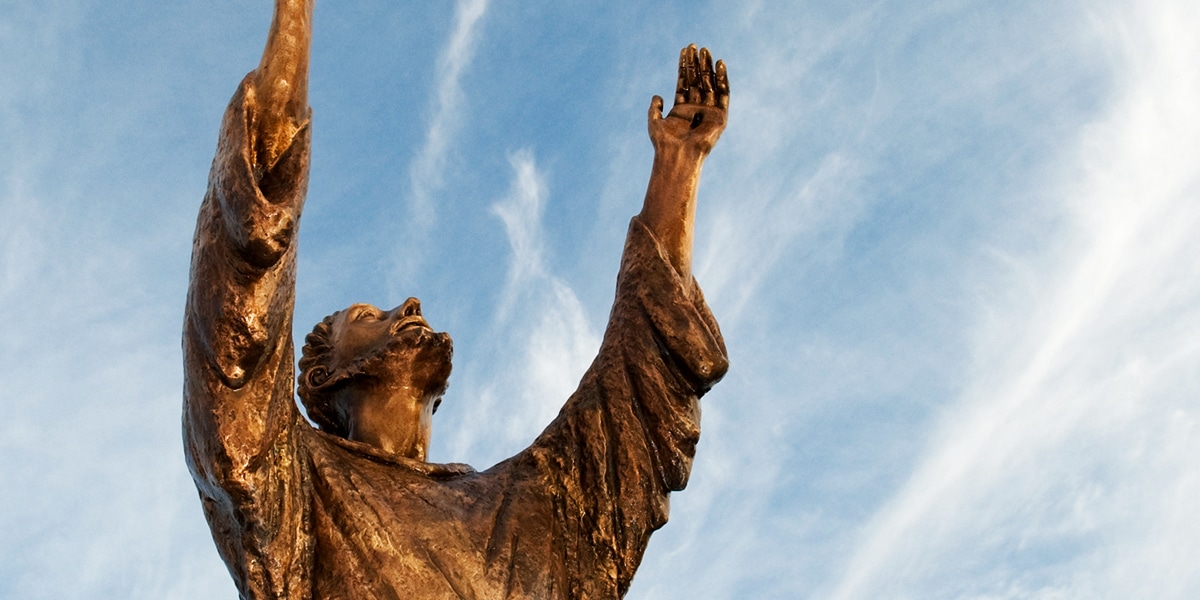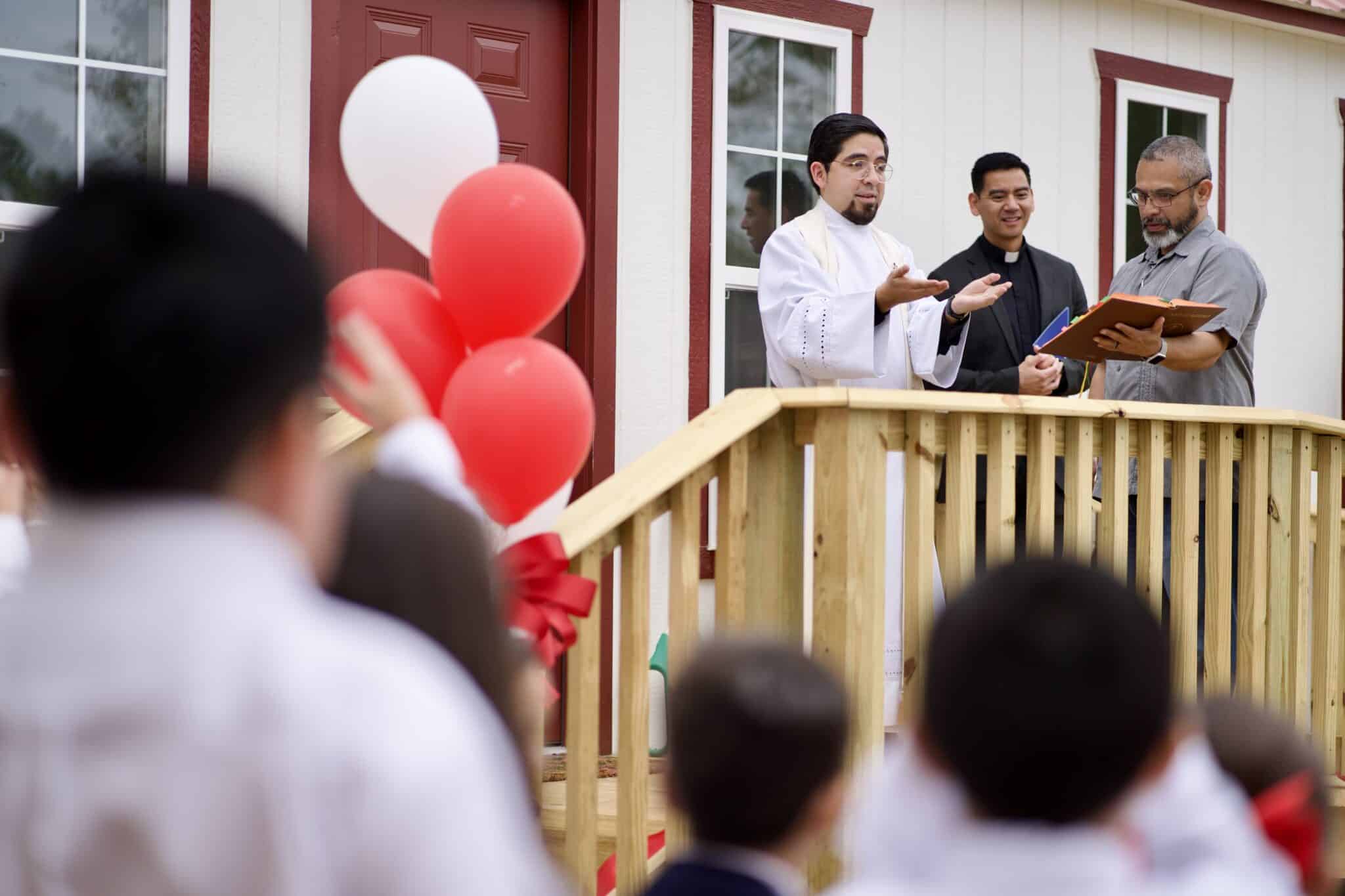(OSV News) — In the wake of Mental Health Awareness Month, the U.S. is still “in the thick of things” and “will be for a long time” in addressing mental well-being, a leader of the U.S. bishops’ mental health initiative told OSV News.
Since 1949, the nation has highlighted mental health issues and resources each May — but much work needs to be done on multiple fronts in this regard, said Archbishop Borys A. Gudziak of the Ukrainian Catholic Archeparchy of Philadelphia.
As chairman of the U.S. Conference of Catholic Bishops’ Committee on Domestic Justice and Human Development, Archbishop Gudziak joined Bishop Robert E. Barron of Winona-Rochester, Minnesota — who leads the USCCB’s Committee on Laity, Marriage, Family Life, and Youth — in unveiling the National Catholic Mental Health Campaign in October 2023.
Several organizations partnered with Archbishop Gudziak and Bishop Barron in developing the campaign — among them Catholic Charities USA, the Catholic Health Association, the National Catholic Partnership on Disability, the U.S. Society of St. Vincent de Paul, the National Federation for Catholic Youth Ministry, the National Catholic Network de Pastoral Juvenil Hispana, the National Institute for Ministry with Young Adults, and the Association of Catholic Mental Health Ministers.
In their introductory message for the effort, the two prelates said their goals were threefold: to raise greater awareness of the issue, to remove the sense of stigma for those suffering from mental illness, and “to advocate a clear message to all: everyone who needs help should get help.”
Archbishop Gudziak recently told OSV News that some progress has been made over the years in recognizing the importance of mental health.
“The awareness is growing, and we see ever more the dangers and the burdens of mental health issues,” he said.
Close to 60 million U.S. adults, or one in five, experienced mental illness in 2021, with more than 14 million of them reporting a serious condition and well over 19 million battling both substance abuse and mental illness concurrently, according to the National Alliance on Mental Illness.
The nation’s youth have been particularly hard hit: In 2021, U.S. Surgeon General Vivek H. Murthy issued an advisory on the issue, citing data that showed in 2019, one in three high school students and half of female students reported feelings of persistent sadness or hopelessness, a 40% spike since 2009.
“At the same time,” said Archbishop Gudziak, “we realize that there’s still a lot of stigma and fear about dealing with mental health in a holistic and professional way.”
The church can provide compassionate, informed outreach to those suffering from mental illness, he said.
“As pastors, we are not necessarily mental health experts,” said the archbishop. “We’re not called to be mental health therapists, but we should all be ready to be mental health ministers. So, one level of promoting awareness would be among the clergy and pastoral leaders, for them to really be on the lookout for mental health issues and to have the knowledge of where to go next in seeking help.”
A second issue, said Archbishop Gudziak, “is that we need to do a lot of mental health preventative medicine.
“There is a way to get ahead of the anxiety, the depression, the loneliness, maybe get ahead of falling into addictions which disturb our mental health,” he said. “Our mental health is subject also to our physical health. So good eating habits, exercise and other aspects of physical well-being can make us more resilient.”
Bishop James D. Conley of Lincoln, Nebraska, attested to the crucial importance of basic self care in his May 2024 pastoral letter, “A Future with Hope,” in which he shared his own struggles with depression and anxiety.
A nonstop schedule amid the height of the clerical abuse crisis in 2018 soon eroded both his sleep habits and appetite, and ultimately resulted in him taking a medical leave of absence for treatment. Now, Bishop Conley stresses among other strategies the need for “making time for sleep, healthy eating, exercise and recreation.”
Both Bishop Conley and the U.S. bishops’ campaign have underscored the need for an integrated Catholic approach to mental health.
“As followers of Christ who are inspired by the word of Scripture, we understand that our well-being needs to be integrated,” Archbishop Gudziak told OSV News. “We are not just a body (and) we’re not just a body and a psyche — but we are embodied souls that are inspired by the Holy Spirit.”
As such, “the heart of our being yearns for communion, just like there is communion between the Father, Son and Holy Spirit,” he said. “We who are created in the image and likeness of God as persons need communion to be well.”
Yet “many mental health issues are connected with alienation, isolation and loneliness,” noted Archbishop Gudziak. “Even the mental health experts who do not speak in spiritual terms will concede and even argue that the lack of good relationships is a cause of, or contributes to, many mental health issues. So we can become more resilient if we foster good relations (with one another). … We flourish in a good community, and that is something that we should really be promoting as much as possible.”
In addressing mental health, “the spiritual element is really quite essential,” said the archbishop. “Much of our tension, anxiety and distress is caused by or is connected to a kind of distortion in our spiritual life. When we do evil things, when we sin, we bend ourselves spiritually out of shape. And this cannot but contribute to mental health issues.”
For that reason, “our spiritual life, which is life in the Holy Spirit, is … a source of healing, a source of wholeness, a source of integrity,” said Archbishop Gudziak.
While “that (perspective) is something that a purely therapeutic, and even more so pharmacological, popular cultural approach to mental health does not necessarily recognize,” he said, “the Lord is the healer of our bodies, of our souls, and he gives us a healthy spirit.”
More Catholic mental health professionals are needed amid a dearth in such resources, he added, noting that pastoral and spiritual support is not intended to “supplant” but rather to complement “medical, psychological and psychiatric treatment.”
Above all, said Archbishop Gudziak, “as with many diseases that are not quickly or easily cured, it is so important to accompany people, to help them feel they are not alone or abandoned — to be Jesus for them.”
By Gina Christian | OSV News







News & Commentary
Gudziak: US still ‘in the thick of things’ regarding mental health, but church can foster healing
(OSV News) — In the wake of Mental Health Awareness Month, the U.S. is still “in the thick of things” and “will be for a long time” in addressing mental well-being, a leader of the U.S. bishops’ mental health initiative told OSV News.
Since 1949, the nation has highlighted mental health issues and resources each May — but much work needs to be done on multiple fronts in this regard, said Archbishop Borys A. Gudziak of the Ukrainian Catholic Archeparchy of Philadelphia.
As chairman of the U.S. Conference of Catholic Bishops’ Committee on Domestic Justice and Human Development, Archbishop Gudziak joined Bishop Robert E. Barron of Winona-Rochester, Minnesota — who leads the USCCB’s Committee on Laity, Marriage, Family Life, and Youth — in unveiling the National Catholic Mental Health Campaign in October 2023.
Several organizations partnered with Archbishop Gudziak and Bishop Barron in developing the campaign — among them Catholic Charities USA, the Catholic Health Association, the National Catholic Partnership on Disability, the U.S. Society of St. Vincent de Paul, the National Federation for Catholic Youth Ministry, the National Catholic Network de Pastoral Juvenil Hispana, the National Institute for Ministry with Young Adults, and the Association of Catholic Mental Health Ministers.
In their introductory message for the effort, the two prelates said their goals were threefold: to raise greater awareness of the issue, to remove the sense of stigma for those suffering from mental illness, and “to advocate a clear message to all: everyone who needs help should get help.”
Archbishop Gudziak recently told OSV News that some progress has been made over the years in recognizing the importance of mental health.
“The awareness is growing, and we see ever more the dangers and the burdens of mental health issues,” he said.
Close to 60 million U.S. adults, or one in five, experienced mental illness in 2021, with more than 14 million of them reporting a serious condition and well over 19 million battling both substance abuse and mental illness concurrently, according to the National Alliance on Mental Illness.
The nation’s youth have been particularly hard hit: In 2021, U.S. Surgeon General Vivek H. Murthy issued an advisory on the issue, citing data that showed in 2019, one in three high school students and half of female students reported feelings of persistent sadness or hopelessness, a 40% spike since 2009.
“At the same time,” said Archbishop Gudziak, “we realize that there’s still a lot of stigma and fear about dealing with mental health in a holistic and professional way.”
The church can provide compassionate, informed outreach to those suffering from mental illness, he said.
“As pastors, we are not necessarily mental health experts,” said the archbishop. “We’re not called to be mental health therapists, but we should all be ready to be mental health ministers. So, one level of promoting awareness would be among the clergy and pastoral leaders, for them to really be on the lookout for mental health issues and to have the knowledge of where to go next in seeking help.”
A second issue, said Archbishop Gudziak, “is that we need to do a lot of mental health preventative medicine.
“There is a way to get ahead of the anxiety, the depression, the loneliness, maybe get ahead of falling into addictions which disturb our mental health,” he said. “Our mental health is subject also to our physical health. So good eating habits, exercise and other aspects of physical well-being can make us more resilient.”
Bishop James D. Conley of Lincoln, Nebraska, attested to the crucial importance of basic self care in his May 2024 pastoral letter, “A Future with Hope,” in which he shared his own struggles with depression and anxiety.
A nonstop schedule amid the height of the clerical abuse crisis in 2018 soon eroded both his sleep habits and appetite, and ultimately resulted in him taking a medical leave of absence for treatment. Now, Bishop Conley stresses among other strategies the need for “making time for sleep, healthy eating, exercise and recreation.”
Both Bishop Conley and the U.S. bishops’ campaign have underscored the need for an integrated Catholic approach to mental health.
“As followers of Christ who are inspired by the word of Scripture, we understand that our well-being needs to be integrated,” Archbishop Gudziak told OSV News. “We are not just a body (and) we’re not just a body and a psyche — but we are embodied souls that are inspired by the Holy Spirit.”
As such, “the heart of our being yearns for communion, just like there is communion between the Father, Son and Holy Spirit,” he said. “We who are created in the image and likeness of God as persons need communion to be well.”
Yet “many mental health issues are connected with alienation, isolation and loneliness,” noted Archbishop Gudziak. “Even the mental health experts who do not speak in spiritual terms will concede and even argue that the lack of good relationships is a cause of, or contributes to, many mental health issues. So we can become more resilient if we foster good relations (with one another). … We flourish in a good community, and that is something that we should really be promoting as much as possible.”
In addressing mental health, “the spiritual element is really quite essential,” said the archbishop. “Much of our tension, anxiety and distress is caused by or is connected to a kind of distortion in our spiritual life. When we do evil things, when we sin, we bend ourselves spiritually out of shape. And this cannot but contribute to mental health issues.”
For that reason, “our spiritual life, which is life in the Holy Spirit, is … a source of healing, a source of wholeness, a source of integrity,” said Archbishop Gudziak.
While “that (perspective) is something that a purely therapeutic, and even more so pharmacological, popular cultural approach to mental health does not necessarily recognize,” he said, “the Lord is the healer of our bodies, of our souls, and he gives us a healthy spirit.”
More Catholic mental health professionals are needed amid a dearth in such resources, he added, noting that pastoral and spiritual support is not intended to “supplant” but rather to complement “medical, psychological and psychiatric treatment.”
Above all, said Archbishop Gudziak, “as with many diseases that are not quickly or easily cured, it is so important to accompany people, to help them feel they are not alone or abandoned — to be Jesus for them.”
By Gina Christian | OSV News